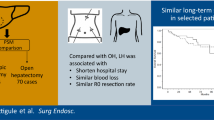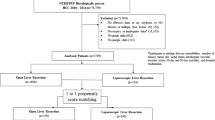Abstract
Purpose
To analyze the long-term oncological outcomes of Barcelona Clinic Liver Cancer (BCLC) stages 0–A hepatocellular carcinoma (HCC) patients associated with or without microvascular invasion (MVI) treated with laparoscopic versus laparotomic liver resection.
Methods
Clinicopathological data of HCC patients with BCLC stages 0–A from four medical centers were retrospectively reviewed. The survival outcomes of patients who underwent laparoscopic hepatectomy were compared with those who underwent laparotomic hepatectomy. Subgroup analyses in terms of MVI were further performed to explore the effect of surgical approaches on the long-term survival outcomes. Propensity score matching (PSM) analysis was used to match patients between the laparoscopic and laparotomic resection groups in a 1:1 ratio.
Results
495 HCC patients at BCLC stages 0–A were enrolled, including 243 in the laparoscopic resection group and 252 in the laparotomic resection group. Laparoscopic resection group had a shorter operation time, less blood loss, a lower frequency of blood transfusion and postoperative complication rates. The laparoscopic resection group had a significantly better overall survival (OS) and recurrence-free survival (RFS) than the laparotomic resection group before and after PSM. Subgroup analysis demonstrated that OS and RFS of patients without MVI were remarkably better in the laparoscopic resection group compared with the laparotomic resection group. However, no significant differences in OS and RFS between the two groups were found in patients with MVI after PSM.
Conclusions
Pure laparoscopic hepatectomy for patients with BCLC stages 0–A HCC can be performed safely with favorable perioperative and long-term oncological outcomes at high-volume liver cancer centers, regardless of the presence of MVI.




Similar content being viewed by others
Data availability statement
The data that support the findings of this study are available from the corresponding author upon reasonable request.
References
Sung H, Ferlay J, Siegel RL, Laversanne M, Soerjomataram I, Jemal A, et al. Global cancer statistics 2020: GLOBOCAN estimates of incidence and mortality worldwide for 36 cancers in 185 countries. CA Cancer J Clin. 2021;71:209–249
Lei Z, Li J, Wu D, Xia Y, Wang Q, Si A, et al. Nomogram for preoperative estimation of microvascular invasion risk in Hepatitis B virus-related hepatocellular carcinoma within the Milan criteria. JAMA Surg. 2016;151:356–363
European Association for the Study of the Liver. Electronic address EEE, European Association for the Study of the L. EASL Clinical Practice Guidelines: management of hepatocellular carcinoma. J Hepatol. 2018;69:182–236
Vogel A, Cervantes A, Chau I, Daniele B, Llovet JM, Meyer T, et al. Hepatocellular carcinoma: ESMO Clinical Practice Guidelines for diagnosis, treatment and follow-up. Ann Oncol. 2018;29:iv238–iv255
Han HS, Shehta A, Ahn S, Yoon YS, Cho JY, Choi Y. Laparoscopic versus open liver resection for hepatocellular carcinoma: case-matched study with propensity score matching. J Hepatol. 2015;63:643–650
Takahara T, Wakabayashi G, Beppu T, Aihara A, Hasegawa K, Gotohda N, et al. Long-term and perioperative outcomes of laparoscopic versus open liver resection for hepatocellular carcinoma with propensity score matching: a multi-institutional Japanese study. J Hepatobiliary Pancreat Sci. 2015;22:721–727
Reich H, McGlynn F, DeCaprio J, Budin R. Laparoscopic excision of benign liver lesions. Obstet Gynecol. 1991;78:956–958
Yoshida H, Taniai N, Yoshioka M, Hirakata A, Kawano Y, Shimizu T, et al. Current status of laparoscopic hepatectomy. J Nippon Med Sch. 2019;86:201–206
Twaij A, Pucher PH, Sodergren MH, Gall T, Darzi A, Jiao LR. Laparoscopic vs open approach to resection of hepatocellular carcinoma in patients with known cirrhosis: systematic review and meta-analysis. World J Gastroenterol. 2014;20:8274–8281
Zhou YM, Shao WY, Zhao YF, Xu DH, Li B. Meta-analysis of laparoscopic versus open resection for hepatocellular carcinoma. Dig Dis Sci. 2011;56:1937–1943
Yin Z, Fan X, Ye H, Yin D, Wang J. Short- and long-term outcomes after laparoscopic and open hepatectomy for hepatocellular carcinoma: a global systematic review and meta-analysis. Ann Surg Oncol. 2013;20:1203–1215
Goh EL, Chidambaram S, Ma S. Laparoscopic vs open hepatectomy for hepatocellular carcinoma in patients with cirrhosis: a meta-analysis of the long-term survival outcomes. Int J Surg. 2018;50:35–42
Jiang S, Wang Z, Ou M, Pang Q, Fan D, Cui P. Laparoscopic versus open hepatectomy in short- and long-term outcomes of the hepatocellular carcinoma patients with cirrhosis: a systematic review and meta-analysis. J Laparoendosc Adv Surg Tech A. 2019;29:643–654
Xiangfei M, Yinzhe X, Yingwei P, Shichun L, Weidong D. Open versus laparoscopic hepatic resection for hepatocellular carcinoma: a systematic review and meta-analysis. Surg Endosc. 2019;33:2396–2418
Marrero JA, Kulik LM, Sirlin CB, Zhu AX, Finn RS, Abecassis MM, et al. Diagnosis, staging, and management of hepatocellular carcinoma: 2018 practice guidance by the American Association for the Study of Liver Diseases. Hepatology. 2018;68:723–750
Lim KC, Chow PK, Allen JC, Chia GS, Lim M, Cheow PC, et al. Microvascular invasion is a better predictor of tumor recurrence and overall survival following surgical resection for hepatocellular carcinoma compared to the Milan criteria. Ann Surg. 2011;254:108–113
Roayaie S, Blume IN, Thung SN, Guido M, Fiel MI, Hiotis S, et al. A system of classifying microvascular invasion to predict outcome after resection in patients with hepatocellular carcinoma. Gastroenterology. 2009;137:850–855
Zhang XP, Chai ZT, Feng JK, Zhu HM, Zhang F, Hu YR, et al. Association of type 2 diabetes mellitus with incidences of microvascular invasion and survival outcomes in hepatitis B virus-related hepatocellular carcinoma after liver resection: a multicenter study. Eur J Surg Oncol. 2022;48:142–149
Li B, Liu T, Zhang Y, Zhang J. Retroperitoneal laparoscopic hepatectomy of recurrent hepatocellular carcinoma: case report and literature review. BMC Gastroenterol. 2020;20:278
Abu Hilal M, Aldrighetti L, Dagher I, Edwin B, Troisi RI, Alikhanov R, et al. The southampton consensus guidelines for laparoscopic liver surgery: from indication to implementation. Ann Surg. 2018;268:11–18
Shi M, Guo RP, Lin XJ, Zhang YQ, Chen MS, Zhang CQ, et al. Partial hepatectomy with wide versus narrow resection margin for solitary hepatocellular carcinoma: a prospective randomized trial. Ann Surg. 2007;245:36–43
Popescu I, Câmpeanu I. Surgical anatomy of the liver and liver resection. Brisbane 2000 Terminology. Chirurgia (Bucur). 2009;104:7–10
Balzan S, Belghiti J, Farges O, Ogata S, Sauvanet A, Delefosse D, et al. The “50–50 criteria” on postoperative day 5: an accurate predictor of liver failure and death after hepatectomy. Ann Surg. 2005;242:824–828 (discussion 828-829)
Koch M, Garden OJ, Padbury R, Rahbari NN, Adam R, Capussotti L, et al. Bile leakage after hepatobiliary and pancreatic surgery: a definition and grading of severity by the International Study Group of Liver Surgery. Surgery. 2011;149:680–688
Tang F, Tie Y, Tu C, Wei X. Surgical trauma-induced immunosuppression in cancer: recent advances and the potential therapies. Clin Transl Med. 2020;10:199–223
Gitzelmann CA, Mendoza-Sagaon M, Talamini MA, Ahmad SA, Pegoli W Jr, Paidas CN. Cell-mediated immune response is better preserved by laparoscopy than laparotomy. Surgery. 2000;127:65–71
Huang C, Zhu XD, Ji Y, Ding GY, Shi GM, Shen YH, et al. Microvascular invasion has limited clinical values in hepatocellular carcinoma patients at Barcelona Clinic Liver Cancer (BCLC) stages 0 or B. BMC Cancer. 2017;17:58
Wang H, Qian YW, Wu MC, Cong WM. Liver resection is justified in patients with BCLC intermediate stage hepatocellular carcinoma without microvascular invasion. J Gastrointest Surg. 2020;24:2737–2747
Ivanics T, Claasen MP, Patel MS, Rajendran L, Shwaartz C, Raschzok N, et al. Long-term outcomes of laparoscopic liver resection for hepatocellular carcinoma: a propensity score matched analysis of a high-volume North American center. Surgery. 2022;171:982–991
Cheung TT, Dai WC, Tsang SH, Chan AC, Chok KS, Chan SC, et al. Pure laparoscopic hepatectomy versus open hepatectomy for hepatocellular carcinoma in 110 patients with liver cirrhosis: a propensity analysis at a single center. Ann Surg. 2016;264:612–620
Katz SC, Shia J, Liau KH, Gonen M, Ruo L, Jarnagin WR, et al. Operative blood loss independently predicts recurrence and survival after resection of hepatocellular carcinoma. Ann Surg. 2009;249:617–623
Chen K, Pan Y, Wang YF, Zheng XY, Liang X, Yu H, et al. Laparoscopic right hepatectomy for hepatocellular carcinoma: a propensity score matching analysis of outcomes compared with conventional open surgery. J Laparoendosc Adv Surg Tech A. 2019;29:503–512
Beppu T, Wakabayashi G, Hasegawa K, Gotohda N, Mizuguchi T, Takahashi Y, et al. Long-term and perioperative outcomes of laparoscopic versus open liver resection for colorectal liver metastases with propensity score matching: a multi-institutional Japanese study. J Hepatobiliary Pancreat Sci. 2015;22:711–720
Acknowledgements
This study was supported by Meng Chao Talent Training Program (EHBH2019YC112) and National Natural Science Foundation of China (82172846).
Funding
Meng Chao Talent Training Program (EHBH2019YC112); National Natural Science Foundation of China (82172846).
Author information
Authors and Affiliations
Contributions
Conception and design: W-XG, S-QC, S-YY, M-LY, Y-FD, J-KF, J-ZY; Administrative support: W-XG, S-QC; Provision of study materials or patients: W-XG, S-QC, M-LY, YD, J-ZY; Collection and assembly of data: S-YY, LG, JX; Data analysis and interpretation: S-YY, J-KF, Y-JX, Z-HL; Statistical analysis: S-YY, J-KF, Y-JX, Z-HL; Manuscript writing: all authors; Final approval of manuscript: all authors.
Corresponding authors
Ethics declarations
Conflict of interest
Shi-Ye Yang, Mao-Lin Yan, Yun-Fei Duan, Jin-Kai Feng, Jia-Zhou Ye, Yan-Jun Xiang, Zong-Han Liu, Lei Guo, Jie Xue, Shu-Qun Cheng and Wei-Xing Guo have no competing financial interests or personal relationships that could have appeared to influence the work reported in this paper.
Ethics approval and consent to participate (ethics)
All procedures performed in this study involving human participants were approved by the Institutional Ethics Review Board of the Eastern Hepatobiliary Surgery Hospital, Fujian Provincial Hospital, The Third Affiliated Hospital of Soochow University, and Affiliated Tumor Hospital of Guangxi Medical University. This study was in accordance with the 1964 Helsinki declaration and its later amendments or comparable ethical standards. Written informed consent for study participation was obtained from all the patients.
Consent to publish (ethics)
All authors confirm that the work described has not been published before and is not under consideration for publication elsewhere. All authors have seen and gave consent to the publication of this study. The publication of this work has been approved by the responsible authorities at the institution where the work is carried out.
Animal research (ethics)
Not applicable.
Clinical trials registration
Not applicable because this is a retrospective observational study.
Synopsis
For hepatocellular carcinoma (HCC) patients at BCLC stages 0–A with or without microvascular invasion (MVI), laparoscopic liver resection may be a safe and feasible alternative to laparotomic liver resection.
Additional information
Publisher's Note
Springer Nature remains neutral with regard to jurisdictional claims in published maps and institutional affiliations.
Supplementary Information
Below is the link to the electronic supplementary material.
Rights and permissions
About this article
Cite this article
Yang, SY., Yan, ML., Duan, YF. et al. Perioperative and long-term survival outcomes of laparoscopic versus laparotomic hepatectomy for BCLC stages 0–A hepatocellular carcinoma patients associated with or without microvascular invasion: a multicenter, propensity score matching analysis. Hepatol Int 16, 892–905 (2022). https://doi.org/10.1007/s12072-022-10353-4
Received:
Accepted:
Published:
Issue Date:
DOI: https://doi.org/10.1007/s12072-022-10353-4




